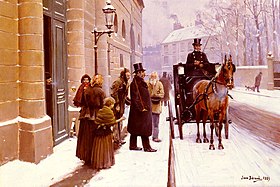
Back Bourgeoisie Afrikaans Burguesía AN برجوازية Arabic بورجوازيه ARZ Burguesía AST Burjuaziya Azerbaijani بورژوازی AZB Буржуазия Bashkir Буржуазія Byelorussian Буржоазия Bulgarian

The bourgeoisie (/ˌbʊərʒwɑːˈziː/ ⓘ BOOR-zhwah-ZEE, French: [buʁʒwazi] ⓘ) are a class of business owners, merchants and wealthy people, in general, which emerged in the Late Middle Ages, originally as an "upper class" between peasantry and aristocracy.[1][2][3] They are traditionally contrasted with the proletariat by their wealth, political power, and education,[4][5] as well as their access to and control of cultural, social, and financial capital.
The bourgeoisie in its original sense is intimately linked to the political ideology of liberalism and its existence within cities, recognised as such by their urban charters (e.g., municipal charters, town privileges, German town law), so there was no bourgeoisie apart from the citizenry of the cities.[6] Rural peasants came under a different legal system.
In communist philosophy, the bourgeoisie is the social class that came to own the means of production during modern industrialisation and whose societal concerns are the value of private property and the preservation of capital to ensure the perpetuation of their economic dominance in society.[7]
- ^ Minehan, Philip (2014). "Bourgeois/Bourgeoisie". The Encyclopedia of Political Thought: 371–373. doi:10.1002/9781118474396.wbept0108. ISBN 9781118474396.
- ^ Göçek, Fatma Müge (2019). "Bourgeoisie". The Blackwell Encyclopedia of Sociology: 1–2. doi:10.1002/9781405165518.wbeosb044.pub2. ISBN 9781405165518.
- ^ Siegrist, Hannes (2015). "Bourgeoisie and Middle Classes, History of". International Encyclopedia of the Social & Behavioral Sciences (Second Edition): 784–789. doi:10.1016/B978-0-08-097086-8.62013-5. ISBN 978-0-08-097087-5.
- ^ "bourgeoisie Facts, information, pictures | Encyclopedia.com articles about bourgeoisie". encyclopedia.com. Archived from the original on 2 October 2016. Retrieved 28 September 2016.
- ^ Siegrist 2001, p. 785.
- ^ Hoipkemier 2015, p. 651.
- ^ "Bourgeois Society". Marxists Internet Archive. Archived from the original on 27 November 1999. Retrieved 15 November 2021.